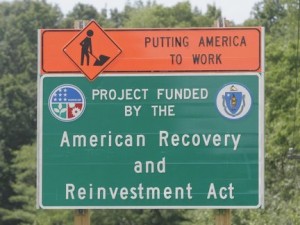 James Heintz ’01G, assistant research professor at the Political Economy Research Institute (PERI) and Robert Pollin, UMass Amherst economics professor and co-director of PERI, commented in a story about the progress of the economic stimulus package. Although you can track the spending through government websites, interpreting the data is “not the easiest thing,” admits Pollin. Heintz points out that one problem stems from the fact that there are many branches of the state and federal governments administering the funds. (Masslive.com, 3/14/2010)
James Heintz ’01G, assistant research professor at the Political Economy Research Institute (PERI) and Robert Pollin, UMass Amherst economics professor and co-director of PERI, commented in a story about the progress of the economic stimulus package. Although you can track the spending through government websites, interpreting the data is “not the easiest thing,” admits Pollin. Heintz points out that one problem stems from the fact that there are many branches of the state and federal governments administering the funds. (Masslive.com, 3/14/2010)
Category: Alums

A column by Heidi Garrett-Peltier ’06G, research fellow at the Political Economy Research Institute (PERI), looks at the idea that increased defense spending to send an additional 30,000 U.S. troops to Afghanistan may help the damaged economy the same way any government spending is used when the economy falters. She says this “military Keynesianism” may work to some degree, but is an inefficient way to spend public money. Instead, she argues, spending on non-military projects creates more jobs and more positive economic impact. (Dollars & Sense, 3/8/10)
 An opinion article in The Hill cites the research of Robert Pollin, UMass economics professor and co-director of the Political Economy Research Institute (PERI) and economist Heidi Garrett-Peltier. Their research supports the argument that investments in reforestation would have a bigger impact, both economically and environmentally, on climate change than investments in energy. Specifically, every million dollars of investment in forest, stream restoration and sustainable land management would produce 39 jobs. These investments are cheaper and would generate more jobs than investments in conventional energy sources. And, although most of the attention on climate change is attributed to coal power plants and automobile’s emissions, only half of global greenhouse gases come from energy. Investing in reforestation would generate immediate shovel-ready jobs and significantly cut down on global green house emission. (The Hill, 3/9/10)
An opinion article in The Hill cites the research of Robert Pollin, UMass economics professor and co-director of the Political Economy Research Institute (PERI) and economist Heidi Garrett-Peltier. Their research supports the argument that investments in reforestation would have a bigger impact, both economically and environmentally, on climate change than investments in energy. Specifically, every million dollars of investment in forest, stream restoration and sustainable land management would produce 39 jobs. These investments are cheaper and would generate more jobs than investments in conventional energy sources. And, although most of the attention on climate change is attributed to coal power plants and automobile’s emissions, only half of global greenhouse gases come from energy. Investing in reforestation would generate immediate shovel-ready jobs and significantly cut down on global green house emission. (The Hill, 3/9/10)

After the Santa Fe Reporter profile piece on Samuel Bowles was published, many economics bloggers have linked to the article which focuses on the work of Samuel Bowles, UMass Amherst professor emeritus and Arjun Jayadev ’01 MA and ’05 Ph.D.
To read more:
Marginal Revolution
Crooked Timber
Economists View
Education Policy Blog

On January 5, 2010, the Real News Network aired an interview with James Heintz (Political Economy Research Institute) in which he discusses how to address structural deficits in state and local governments as a way to deal with high unemployment. He says planning budgets in longer cycles and using federal funding to boost state economies can be helpful. View the video.
In her regularly featured New York Times Economix blog, UMass Prof Nancy Folbre  draws on new research by UMass’s James Crotty to look at the large bonus payments to bankers, even in the years of the finance-led crash.
draws on new research by UMass’s James Crotty to look at the large bonus payments to bankers, even in the years of the finance-led crash.
Banker Bonus Rain by Nancy Folbre Wall Street firms have always been famous for their generous bonuses to managers and traders — their so-called rainmakers. …What is especially striking is the high level of these bonuses in 2007 and 2008, years in which profits were negative. [Read the rest at http://economix.blogs.nytimes.com/2009/11/02/banker-bonus-rain/]